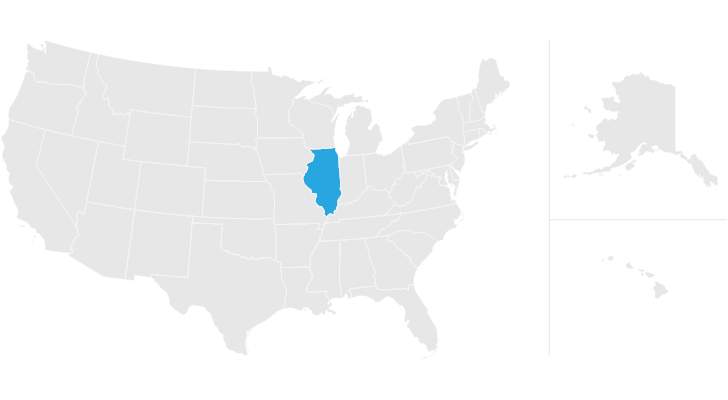The Illinois estate tax rate is graduated and goes up to 16%. However, it is only applied on estates worth more than $4 million. So if you live in the Prairie State and are thinking about estate planning, you should learn about this all-important tax law. Despite the Illinois estate tax, make sure you also understand the federal estate tax, which has a much higher exemption of $15 million in 2026.
Do you need help with estate planning? Use SmartAsset’s free matching tool to find professional advisors who serve your area.
Illinois Estate Tax Exemption
The estate tax threshold for Illinois is $4 million. This means that if you die and your total estate is worth less than $4 million, the estate won’t owe anything to the state of Illinois. If your estate is worth more than $4 million, though, there is a progressive estate tax rate for all wealth your estate will have to pay before money can be dispersed to your heirs.
Unlike some other states, the Illinois exemption is not portable between spouses, so when both people in a married couple have died the exemption is still $4 million.
Illinois Estate Tax Rate

The estate tax rate for Illinois is graduated and the top rate is 16%. Remember that in Illinois, you pay taxes on the entire estate if it is above the $4 million threshold.
Find your taxable estate bracket in the chart below. The second column, Base Taxes Paid, shows what you owe on money that falls below your bracket. Then figure out how much of your estate falls above the lower limit of your bracket. Multiply that number by the marginal rate, add it to the base rate and you’ll know your estate tax burden. In addition, the chart below shows no taxes owed on the first $40,000 of taxable income because of a system of tax credits from the state.
Illinois Estate Tax Rates
| Taxable Estate* | Base Taxes Paid | Marginal Rate | Rate Threshold** |
| $1 – $40,000 | $0 | 0% | $0 |
| $40,000 – $90,000 | $0 | 0.8% | $40,000 |
| $90,000 – $140,000 | $400 | 1.6% | $90,000 |
| $140,000 – $240,000 | $1,200 | 2.4% | $140,000 |
| $240,000 – $440,000 | $3,600 | 3.2% | $240,000 |
| $440,000 – $640,000 | $10,000 | 4.0% | $440,000 |
| $640,000 – $840,000 | $18,000 | 4.8% | $640,000 |
| $840,000 – $1.04 million | $27,600 | 5.6% | $840,000 |
| $1.04 million – $1.54 million | $38,800 | 6.4% | $1.04 million |
| $1.54 million – $2.04 million | $70,800 | 7.2% | $1.54 million |
| $2.04 million – $2.54 million | $106,800 | 8.0% | $2.04 million |
| $2.54 million – $3.04 million | $146,800 | 8.8% | $2.54 million |
| $3.04 million – $3.54 million | $190,800 | 9.6% | $3.04 million |
| $3.54 million – $4.04 million | $238,800 | 10.4% | $3.54 million |
| $4.04 million – $5.04 million | $290,800 | 11.2% | $4.04 million |
| $5.04 million – $6.04 million | $402,800 | 12.0% | $5.04 million |
| $6.04 million – $7.04 million | $522,800 | 12.8% | $6.04 million |
| $7.04 million – $8.04 million | $650,800 | 13.6% | $7.04 million |
| $8.04 million – $9.04 million | $786,800 | 14.4% | $8.04 million |
| $9.04 million – $10.04 million | $903,800 | 15.2% | $9.04 million |
| $10.04 million and up | $1,082,800 | 16.0% | $10.04 million |
*The taxable estate is the total above the 2026 exemption of $4 million.
**The rate threshold is the point at which the marginal estate tax rate goes into effect.
What Is the Estate Tax?
The estate tax is a tax some states and the federal government levy on the estates of wealthy people after they have died but before the money is given to their heirs. It is sometimes called the “death tax.”
Don’t confuse the estate tax with the inheritance tax, which is a separate tax some states levy on recipients of an inheritance after it has been passed on.
Illinois Inheritance Tax
There is no inheritance tax in Illinois. The inheritance tax of other states could apply to you, though. In Kentucky, for instance, inheritance tax must be paid on any property inherited in the state, even if the heir doesn’t live there.
Illinois Gift Tax
There is no gift tax in Illinois. There is a federal gift tax that applies on gifts worth more than $19,000 in 2026 and 2025. Any gift worth more than that given to one person in a year counts against the 2026 lifetime gift tax exemption of $15 million.
Illinois Estate Tax for Married Couples
The Illinois estate tax is not automatically portable between married couples. When one spouse dies, all wealth transfers to the surviving spouse without being subjected to the estate tax. When the second spouse dies, though, the estate can only use one spouse’s exemption.
Some couples use legal trusts to decrease the estate tax burden. If you think your estate will be subject to the estate tax, you should consider speaking to a financial advisor or an estate planning attorney to find how to use a trust.
Federal Estate Tax
There is also a federal estate tax you may be subject to, but it has a much higher exemption. The federal estate tax exemption is $15 million in 2026 and $13.99 million in 2025. It is portable between spouses, meaning if the right legal steps are taken, a married couple can protect up to $30 million in 2026.
If an estate exceeds that amount, the top tax rate is 40%. A full chart of federal estate tax rates is below. You can use the same method described in the Illinois Estate Tax section to figure out your federal estate tax burden.
Federal Estate Tax Rates
| Taxable Estate* | Base Taxes Paid | Marginal Rate | Rate Threshold** |
| $1 – $10,000 | $0 | 18% | $1 |
| $10,000 – $20,000 | $1,800 | 20% | $10,000 |
| $20,000 – $40,000 | $3,800 | 22% | $20,000 |
| $40,000 – $60,000 | $8,200 | 24% | $40,000 |
| $60,000 – $80,000 | $13,000 | 26% | $60,000 |
| $80,000 – $100,000 | $18,200 | 28% | $80,000 |
| $100,000 – $150,000 | $23,800 | 30% | $100,000 |
| $150,000 – $250,000 | $38,800 | 32% | $150,000 |
| $250,000 – $500,000 | $70,800 | 34% | $250,000 |
| $500,000 – $750,000 | $155,800 | 37% | $500,000 |
| $750,000 – $1 million | $248,300 | 39% | $750,000 |
| Over $1 million | $345,800 | 40% | $1 million |
*The taxable estate is the total above the 2026 exemption of $15 million.
**The rate threshold is the point at which the marginal estate tax rate goes into effect.
Overall Illinois Tax Picture

Illinois is a very tax-friendly state for retirement. Almost all retirement income in Illinois is tax-free, including pension plans, retirement plans and Social Security. For non-retirees, calculating Illinois income tax is fairly easy as the state has a flat tax of 4.95% that applies to everyone, regardless of income. You can figure out what your take home pay will be using our Illinois paycheck calculator.
Property taxes in Illinois are very burdensome, with an effective rate of 1.92%, which is the highest rate in the country. The sales tax system is a bit complicated. There is a 1% statewide tax on groceries, drugs and medicine, plus local taxes of up to 1.25%. The base rate for general merchandise is 6.25%, and local taxes add up to 4.75% to that number.
Estate Planning Tips
- A financial advisor can help you properly plan out your estate and make sure you know what taxes you may be on the hook for. Finding a financial advisor doesn’t have to be hard. SmartAsset’s free tool matches you with vetted financial advisors who serve your area, and you can interview your advisor matches at no cost to decide which one is right for you. If you’re ready to find an advisor who can help you achieve your financial goals, get started now.
- Contrary to popular belief, establishing a trust is not just for the uber-wealthy. A trust can be a useful tool for planning your estate, so you might want to consider it.
Photo credit: ©iStock.com/FatCamera, SmartAsset, ©iStock.com/filo
